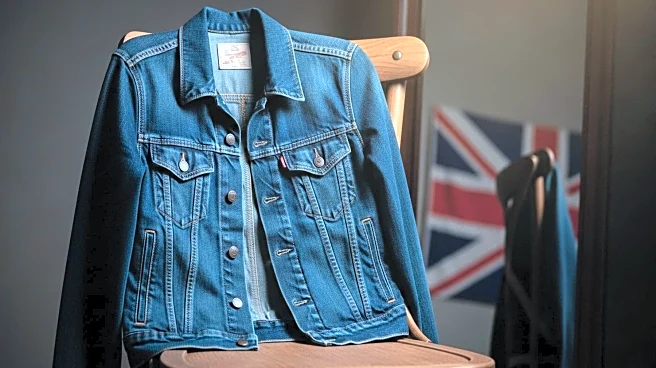What's Happening?
Levi's has expressed concerns that rising anti-American sentiment, attributed to President Trump's tariffs and policies, may negatively affect its sales in the UK. The company, which distributes Levi's and Dockers clothing brands, highlighted this risk in its UK accounts, despite reporting an 8.8% increase in sales to £96.8 million and a 23% rise in pre-tax profits to £9.6 million. Levi's noted that changing consumer sentiment could lead British shoppers to prefer national or European products over American brands. This concern is compounded by other challenges such as competition from retailer own-label products and the pressure on department store stockists due to increased online competition and inflexible rents. Levi's UK arm, employing over 1,600 people, is among the first US brands to openly address the potential impact of the Trump administration on its sales.
Why It's Important?
The warning from Levi's underscores the broader implications of President Trump's trade policies on American brands operating internationally. If anti-American sentiment continues to grow, it could lead to a shift in consumer preferences, affecting sales and market share for US companies abroad. This situation highlights the interconnectedness of global trade and the potential repercussions of political decisions on economic stakeholders. Brands like Levi's may face increased competition from local and European products, which could impact their profitability and market position. Additionally, high inflation and changing consumer priorities could further strain the apparel industry, as consumers may prioritize basic needs over fashion purchases.
What's Next?
Levi's and other US brands may need to strategize on how to mitigate the impact of anti-American sentiment and adapt to changing consumer preferences. This could involve increasing marketing efforts to reinforce brand loyalty or exploring partnerships with local entities to enhance their appeal. The recent federal appeals court ruling in Washington DC, which deemed most of Trump's tariff policies illegal, could also influence future trade dynamics. If upheld, this decision might lead to a Supreme Court case, potentially altering the legal framework governing US trade policy and affecting international business operations.
Beyond the Headlines
The situation with Levi's reflects broader ethical and cultural dimensions, as consumer choices increasingly align with political and social values. The rise of apps like Maple Scan in Canada, which help consumers identify US-made products, indicates a growing trend of conscientious consumption. This shift could prompt brands to reconsider their global strategies and address the cultural sensitivities of their target markets. Long-term, this development may lead to a reevaluation of brand identity and marketing approaches, emphasizing local relevance and ethical considerations.









